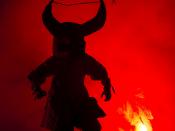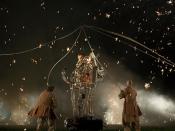The stereotypical hero: strong, bold, courageous, smart, attractive - the perfect role model. Taking a closer look, however, would reveal that this archetype does not always fulfill this idea of a perfect "man". There are various types of heroes, each with his own qualities and characteristics. The mythic hero and tragic hero are two primary examples. Although both have the word hero in their titles, epic tales such as Oedipus Rex, The Epic of Gilgamesh, and The Odyssey reveal that the destinies of the heroes can affect and distinguish a hero by something binding them all together: fate.
The fate of the mythic hero involves a goal, the completion of which will give the hero success and glory. In the Gilgamesh, "The father of the gods had decreed the destiny of Gilgamesh" (17). The gods had given Gilgamesh "kingship, such [was his] destiny", the "power to bind and to loose, to be the darkness and the light of mankind", and "unexampled supremacy over the people" (17).
Thus Gilgamesh's destiny of greatness was immediately established by the gods. Gilgamesh stated, "I have not established my name stamped on bricks as my destiny decreed; therefore I will go to the country where the cedar is felled. I will set up my name in the place where no man's name is written yet I will raise a monument to the gods" (18). The mythic hero was determined to fulfill his fate and make a name for himself. Gilgamesh then journeyed to the forest, defeated the ferocious giant Humbaba, conquered the bull of heaven, and went on to search for everlasting life. As Gilgamesh's quest progressed, the hero was getting closer and closer to attaining his destiny and making his name. Gilgamesh's destiny was ultimately fulfilled, "None will leave a monument for generations...


